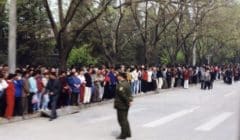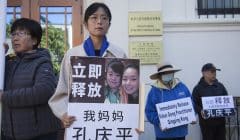Lin Qian: A family torn apart by torture

Rao Zhuoyang and Lin Qian with their daughter Deru
It was a warm December day in China’s southern Guangdong province when Lin Qian, a nurse in a Guangdong province dental hospital, says her life was saved. Although only 23 years old, Qian had been diagnosed with a brain tumor and a severe stomach disease. Doctors advised that she would never be able to have a child – news that devastated her and her husband, Rao Zhuoyang.
Qian had sought a cure to her health problems, including through the practice of various qigong exercises – traditional movements, mediation and breathing regimens that many Chinese citizens embraced as a path to better health. Having made little progress, she was beginning to grow disillusioned.
It was then that Qian’s husband propose they attend a seminar taught by Li Hongzhi, a relatively new qigong master whose practiced was rumored to be somehow different from all the others. Rather than simply teaching a set of slow-moving exercises, Li taught about a mind-body connection. His practice, Falun Dafa, was centered on the cultivation of virtues – namely those of truthfulness, compassion and tolerance – as a means to achieving health and higher realms of mind.
After attending one seminar, Lin Qian and her husband were hooked. On her next hospital visit, Qian was told that her tumor had cleared. Four years later, the couple welcomed the birth of their daughter, Deru.
They were surprised, then, when on July 22, 1999, China’s president Jiang Zemin had Falun Dafa declared illegal. It was now illegal to practice the faith, to possess its literature, or to protest the ban. Those who defied the ban risked imprisonment and torture. Yet Qian and her husband had no intention to comply with the government’s order.
On September 7, 1999, Zhuoyang traveled over 2,000 kilometers to Beijing to make a peaceful appeal to the government to reverse the ban on Falun Gong. On his return home, he was taken by police to a detention center, where he stayed for 15 days, unbeknownst to his wife. After his release, officials of the local “6-10 Office” continued to monitor the family.
The following summer in 2000, Zhuoyang was again arrested from his job as a food quality inspector, possibly because authorities feared he would protest on the first anniversary of the ban against Falun Gong. For nearly two months, he was held in mental institution, where he was forced to attend indoctrination sessions, was injected with nerve-damaging drugs and force-fed solutions of hot pepper and salt water. On his release, Zhuoyang was demoted at work, and his salary cut down to a less than a third of what it had been.
For the next year, the family struggled to raise their young daughter on the meager wages they were now earning. Yet their ordeal was not over. One year after he was released from a mental hospital, Zhuoyang was picked up again. This time, he was sent to the Guangzhou Reeducation School, a center notorious for the torture its guards inflicted on Falun Gong adherents. For one month, he was made to attend brainwashing classes and faced abuse for non-compliance.
On September 30, 2001, Zhuoyang was released from detention for the third time in two years. Believing he would be arrested again, he spent the next three weeks on the run, afraid to return home for fear of endangering his family. Then, on October 24, he was arrested for a fourth time and taken to the Haizhu City labor camp. Within months of his incarceration, his weight had dropped from 150 lbs to just 77 lbs.
At this point, Lin Qian knew not of her husband’s whereabouts. She hadn’t heard from him since he left home to flee police surveillance several months earlier. Then one day, she was called to a local hospital, where she found her emaciated husband. She was asked to take him home, as the labor camp didn’t want him to die on their watch. On his return home, Zhuoyang’s own daughter, now only 3 years old, couldn’t recognize him.
Zhuoyang had become a mere shadow of the man he once was. Where only a couple years before he held a successful career, torture had now rendered Zhuoyang despondent and slow, and barely capable of tending to his daughter. But that’s exactly what he had to do, because on January 19, 2002, Lin Qian was abducted from her work and sent to a reeducation center to endure five months of physical and mental torture.
On June 19, 2002, Qian was finally released and reunited with her husband and child. The reunion was short-lived, however. Three days later, Zhuoyang was arrested again from his home. It would be the last time.
It took only four days before Zhuoyang was sent from the labor camp to a hospital with severe lacerations on his legs, bruises, and a fractured vertebrae. Six days later, the hospital notified Qian as to her husband’s whereabouts.
By the time she arrived at the hospital, her husband could no longer speak. Tears streamed down his face, still swollen from bruising. He died one month later, and Qian was told that if she wanted his body, she would have to pay 100,000 Yuan.
Qian spend the next several months facing the daily threat of abduction by security officers, who feared that she would spread the word about what happened to her husband. Her salary was slashed, and she was not allowed to bring her daughter to the company daycare. Unable to support herself and her child, Qian resorted to desperate measures, fleeing to Thailand and seeking refugee status through the United Nations. In November 2007, Qian and her daughter Deru were granted asylum in the United States. They now live in New York.






